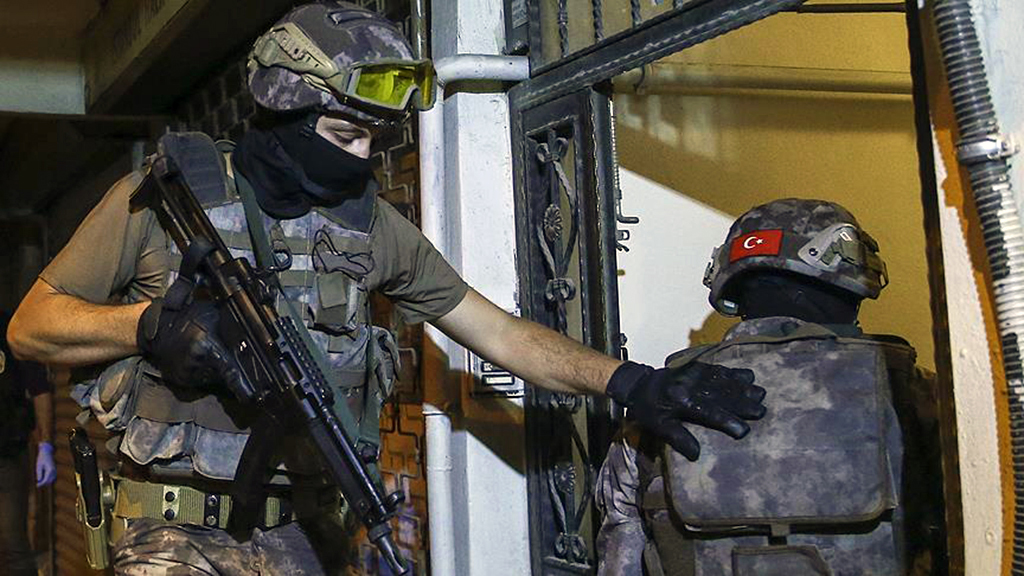
Turkey's fight against PKK gains new momentum ahead of elections
With just two weeks left until the June 24 elections, Turkey has been preoccupied with an agreement with the United States on Manbij and a military operation against the terrorist organization PKK's command center in northern Iraq.
Share
With just two weeks left until the June 24 elections, Turkey has been preoccupied with an agreement with the United States on Manbij and a military operation against the terrorist organization PKK's command center in northern Iraq.
To be clear, both developments suggested that Turkey's fight against the PKK and its Syrian affiliates, the Democratic Union Party (PYD) and its armed wing the People's Protection Units (YPG), has gained new momentum in the aftermath of Operation Olive Branch. At the same time, they reiterate Ankara's commitment to eliminating the PKK presence in Syria and Iraq. It would appear that Turkey has fully adopted its "preventive security" approach and will conduct security operations even though national elections are just around the corner.
As a matter of fact, Turkish officials had publicly announced before Operation Olive Branch was completed that Turkey was going to launch a military operation against PKK militants in Iraq in May. Turkish security forces initially set foot in northern Iraq on March 11, shortly before the Iraqi parliamentary election. Today, there are approximately 4,000 Turkish troops operating in up to 30 kilometers south of the Turkey-Iraq border. As they take control of PKK training camps, they are counting down the days until a comprehensive ground offensive is launched in the Qandil mountains.
Meanwhile, opposition leaders made a futile attempt to describe the move as a public relations stunt of the Justice and Development Party (AK Party) government ahead of the June 24 elections. Unsurprisingly, the Republican People's Party (CHP) quickly changed its position on the issue. Although minority whip Özgür Özel claimed that there were "no PKK militants left in Qandil" and accused the government of "exploitation," CHP Chairman Kemal Kılıçdaroğlu was forced to pledge his support to a potential military operation against the PKK command center.
The main opposition party possibly changed its mind upon developing a better understanding of the government's commitment; or perhaps they thought back to Operation Olive Branch, during which they urged the military to refrain from entering Afrin's city center. It goes without saying that such mistakes could come with a heavy price tag for the CHP and their presidential candidate, Muharrem Ince, ahead of the June 24 elections. Negotiating an agreement, under which the YPG militants will pull out of Manbij, was a major diplomatic success of the AK Party government – but it took lengthy negotiations to reach this point. The imminent military operation against the PKK's command center in Qandil, in turn, is part of a new national security strategy that Turkey adopted two years ago to fight terrorism outside its borders.
To be clear, Turkey's commitment to its new national security concept compels its neighbors, including Iraq and Iran, to cooperate with Ankara more closely. Likewise, it takes Turkey's relations with the United States to the next level. Although relations were strained for a while, the possibility of "working together" is back on the table today. The Manbij agreement represents a concrete step toward closer cooperation between Ankara and Washington in Syria. According to the road map, which was unveiled on June 4, the YPG militants will withdraw from the area and Manbij will be jointly controlled by Turkey and the United States within 90 days. Moreover, YPG militants pulling out of Manbij will be stripped of all heavy weapons.
Finally, the agreement will set an example for other parts of Syria, which have been liberated from Daesh. Syrians will be able to return to Manbij, which will be governed by local people. Coupled with recent claims that the FBI has launched a "serious investigation" into Fetullah Gülen's activities, the Manbij agreement fuels hope that Turkey and the United States can turn over a new leaf in their relationship.
Although the Manbij agreement inspires hope, however, it is important to note that repairing the relationship is no easy task. To make progress, Ankara and Washington must find creative solutions to each of their problems rather than aim for quick recovery. After all, their relations have been strained since 2013 and, over the past two years, Washington's support for the YPG militants, the Halkbank trial, the question of Fetullah Gülen's extradition to Turkey, Turkey's decision to purchase the S-400 air defense system from Russia, questions on the delivery of F-35 fighters and the ongoing trial of Andrew Brunson took a toll on both sides.
If the United States keeps its promises on Manbij, it will be able to solve its specific problems with Turkey and, more broadly, hold talks on the future of Syria and Iran with the Turks. For the time being, Washington elites maintain that it is high time for Turkey and the United States to repair their relationship, but the Donald Trump administration must make a more serious effort to ensure that the spirit of cooperation can replace anti-Turkish and anti-President Recep Tayyip Erdoğan sentiments in Washington.
Tags »
Related Articles






